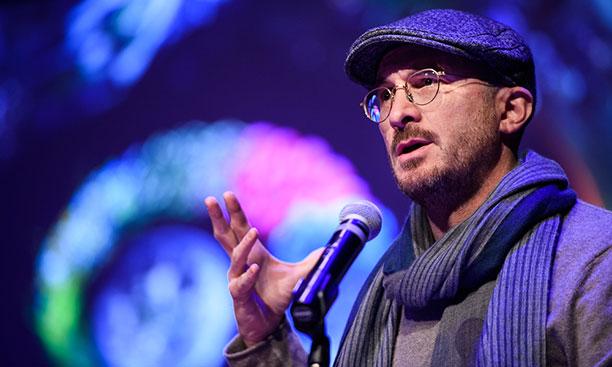
Director Darren Aronofsky gave students an advance screening March 12 of the first episode of his latest project: a 10-part miniseries for National Geographic titled One Strange Rock. Debuting March 26, the miniseries, hosted by Will Smith, will explore a different element of Earth’s history and makeup in each episode.
PAW spoke with Aronofsky, best known for feature films such as Mother!, Black Swan, and Requiem for a Dream, about the influences for his first documentary effort.
“I come from a science background,” Aronofsky said. “My father was an Earth science teacher. I was definitely raised with that type of perspective.”
“National Geographic was always inspiring,” he said. “I had a big shelf full of yellow magazines that stayed with me for years.”
For Aronofsky, the transition from working on feature films to working on a 10-part television documentary, though daunting, was fairly natural.
“I was made to feel safe by working with Nutopia, which is this British production company that has done things like this. I knew they would be doing a lot of the heavy lifting with the logistics, and they would look to us to do what we do, which is tell stories,” he said.
“It’s a unique project in that there are lots of amazing images,” Aronofsky added. “We shot in over 140 locations in six continents, and we also shot original footage on the International Space Station. I worked with an astranaut, telling him how I wanted shots to be covered, and he did a beautiful job.”
Aronofsky served as the executive producer of One Strange Rock, and, due to the show's large scale, much of his role was carried out off the set.
“When I make movies, I kind of rip my heart out and serve it on a platter like I did in Mother! With this one I got to be more of a godfather, where I was guiding it. So it was a fun process as well,” he said.
In addition to executive producing Once Strange Rock, Aronofsky has directed eight feature films to date. His breakout debut Pi (1998) is nearing its 20th anniversary this summer.
Aronofsky, who graduated from Harvard with a degree in social anthropology in 1991, credits the required classes he took in college as having greatly influenced his artistic path. “I’ve probably made more films off of those classes than anything,” he said. “I took a class on the Bible, which I never would have done otherwise, and that led me to make three films on the Bible.”
“That’s why you’ve got to have a liberal arts education,” Aronofsky said. “That’s what’s so great: You come in, you get exposed to so many different ideas, and you will end up using them in ways unexpected.”
Aronofsky’s works often contain religious themes (his 2014 film Noah being the most obvious example). But subjects such as nature and the environment are strong influences as well. Last week, speaking at the South by Southwest conference in Austin, Aronofsky said that his 2017 thriller Mother! is a metaphor for, “Mother Earth and how we treat Mother Earth.”
After Monday’s screening in Richardson, Aronofsky took questions from Princeton students and community members.
“I’ve been an environmentalist since I was a teenager,” Aronofsky said, in response to a question asking about his motivation for making One Strange Rock. “Unfortunately, it’s become an incredibly critical issue in our lifetime.”
With One Strange Rock, Aronofsky said he hopes to highlight the value of Earth’s ecosystems, without directly mentioning climate change.
“It’s important to show the beauty of something so that you know what you’re potentially losing,” he said. “Feeding into the pessimism is helpful for some but it’s hurtful to a lot.”
